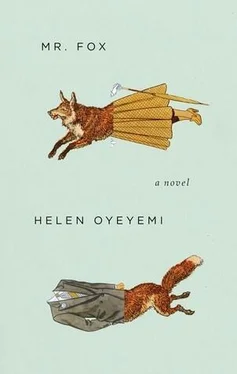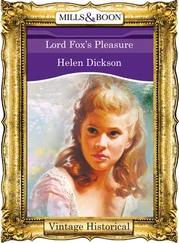Fairy-tale princess seeks fairy-tale prince. Sarcastic and/or ironic replies will be ignored; I am in earnest, and you had better be, too .
If the advertisement sounded as if Miss Foxe was fed up, that’s because she was.
As a result of her advertisement, Miss Foxe received seventeen moderately interesting propositions, fifteen pages of lunatic verse (from fifteen different lunatics), twelve sarcastic and/or ironic replies (six of each), and a single foxglove wrapped in clear cellophane. The foxglove was accompanied by a card that read: Fitcher. The name was printed above an address not too far from where Miss Foxe lived.
Miss Foxe held the flower and walked all around her bedroom in quick circles. Her steps sped up so that she was almost running. She felt her heart beating in her fingertips. She knew the foxglove’s meaning in the language of flowers — beauty and danger, poison and antidote. The digitalis made the heart contract. If your heart was too slow, then it worked to make you well. If your heart was sound, the digitalis killed. This Fitcher, whoever he was, understood the beautiful risk of the fairy tale. She wrote to Fitcher at once, and three days later he met her at a coffee shop after work.
Fitcher bemused Miss Foxe. He looked at her. He looked at her eyes, her ears, her teeth, her neck, her breasts. And he was a quiet man but not in the way that she was quiet. His quiet was of the measured kind, entered into to conceal his thoughts. He stepped noiselessly upon the floor. She dreaded that at first.
“Is Fitcher your only name?” she asked him.
He answered: “I have no other.”
They spoke of fairy tales, and found their tastes were exactly matched. Encouraged, she met him again, and again. At their fourth meeting, as they walked between glass cases at the British Museum, Fitcher threaded Miss Foxe’s fingers through his own. She froze. She did not find it easy to be touched by Fitcher; she found that her hand was warming his, and that though his hand was strong, it moved gently with hers.
At their sixth meeting, Fitcher brought Miss Foxe a nightingale in a gold-painted cage. He set the cage down on the shop counter and draped a black cloth over it. And the bird sang out its hope, the silly little romantic calling out for a mate, not caring if this nightfall was a trick.
Mrs. Nash approved of Fitcher. “A proper Romeo, that one,” she said.
“He doesn’t talk much, though,” Miss Foxe confided. “It worries me.”
“It’s better that way,” Mrs. Nash returned. “Pay attention to what he does, not what he says — that’s the rule.”
And to this she added various other adages, such as “It’s in his kiss,” etc.
By their seventh meeting, Miss Foxe had grown so sure of Fitcher that she felt ready for the next step. She invited him to her flat, where she cooked him dinner and they drank wine by candlelight. Fitcher seemed appreciative but as usual said little. At last they were sitting on the sofa, together. She fed him bites of lemon tart. Fitcher looked as if he was enjoying both the food and the attention. Once that was over with, Miss Foxe reached behind the sofa and produced an antique sword that had been in her family for many years. It was half her height, and heavy, but shiny and sharp, as she had recently had it oiled and sharpened. She laid the sword across their laps.
“Take this sword,” Miss Foxe said solemnly, “and cut off my head!”
Fitcher and Miss Foxe both fell to thinking of their favourite fairy tale, The White Cat, and the enchanted princess, pleading with her love to strike the blow that would release her from her animal form.
“Are you sure?” Fitcher asked. From Miss Foxe’s bedroom, the nightingale sang in its cage.
Miss Foxe sighed. “Don’t you believe. .?”
“Oh, I do,” said Fitcher. “I do.” And without further argument he unsheathed the sword and cleaved Miss Foxe’s head from her neck. He knew what was supposed to happen. He knew that this awkward, whispering creature before him should now transform into a princess — dazzlingly beautiful, free, and made wise by her hardship.
That is not what happened.
Iwalked into my study — I don’t know where from. Where had I just come from? What had I been doing? My step, at least, was sprightly — maybe I’d just come from a book launch, or an award ceremony, or a meeting with an effusive film executive. I searched my pockets for clues, but my pockets were empty. Well. Wherever I had been, Mary Foxe had been there, too. Was I certain about that, or was I guessing? I whipped open the study door and regarded the hallway with a measure of suspicion. Everything was in order. I turned back to my study and registered the condition it was in — books and crumpled paper and broken records were scattered around me as if they had rained from the sky. The windows stood wide open, and a cold wind flowed in and made the torn pages of my books whisper. One of my shelves had fallen, or been pushed, down, and I had to walk across the back of it to get to my desk, which was soaked in ink. Thorough. The rampage had been thorough. I whistled, and then I closed the windows. The sound must have alerted Daphne, because she came and knocked on the door. Which wasn’t closed, so why knock. .
“Come in,” I said. I picked up half of a coffee mug and half of a phonograph record and idly held them together. A domestic chimera. Daphne came in with her arms full of books, and her eyes blazing like two poisoned moons. “How’d you like the mess, St. John?” It would’ve been better if she’d screamed. The question was in monotone, and was accompanied by a hardback German edition of my first book, Stinging the Bees. More followed — books and flat statements, all aimed at my head. I was stunned and defended myself as best I could with my arms, but there was nowhere to hide. Daphne said she hadn’t finished yet. She said she ought to burn the house down, and she just might do it, while I was sleeping. She said I was a dead man walking. She said she was going to Reno. She said she should never, never have married a tarnished individual like me. Finally, at the top of her voice, she said, WHO IS SHE? THIS WOMAN YOU’RE HUMILIATING ME WITH.
She ran out of books and stood there, crying, her hands fluttering over her face. I’d fallen into a crouch to weather the storm, and I waited a second before I straightened up. My ear was bleeding a little, and when she saw that, she sobbed even harder. We looked at the crack she’d made in one of the windows — the Japanese edition of The Butcher’s Boots is no slim tome.
“Who is she?”
“Who is who?”
Daphne turned on her heel and made for the door.
“Where are you going?”
“To Reno. You’d better not contest the papers, either.”
I crossed the room and caught her hand, which seemed like the coldest and most fragile little thing in the world just then. I held her hand, patted it. She looked away and just let me hold it, as if it was of no use to her anymore. My wife was pretty, I noticed. Sort of elfin but vulnerable-looking with it. All these wispy curls surrounding a heart-shaped face.
“Don’t go to Reno,” I said. She looked at me out of the corner of her eye.
“That’s it? That’s your best shot at making me stay? ‘Don’t go to Reno’?”
“I hadn’t finished, D. I also wanted to tell you that you’re paranoid. I don’t even know what you’re talking about. All I’ve been doing is trying to win us some bread.” I raised her hand and kissed her wrist — she likes that. “Give me a week or two and then we’ll go someplace nice, just you and me.”
She was melting; she made a face. “Of course just you and me. . Who else would go with us, dummy?”
Читать дальше












